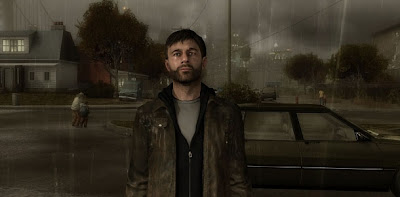Stockholm syndrome

Towards the end of Heavy Rain's narrative arc, you are faced with a not so simple choice: to drink or not drink from a bottle that may or may not be filled with poison, which in turn may or may not allow you to discover the location of your kidnapped son who may or may not be still alive.
In most games such an exercise in free will would be bifurcated to the "good" or "bad" option: i.e. help the elderly lady cross the street or kidnap and sell her to a sex trafficking ring. But in Heavy Rain, the decision is terrifyingly drenched in ambiguity: at many junctures in the game, you are forced to make quick judgements without a full understanding of their consequences.
The fact that I had to pause and weigh the potential outcomes of The Rat trial, a feat rarely attempted in video games, leads me to say that Heavy Rain is a success, albeit not an unqualified one.
Heavy Rain's success or failure hinges on how much you are willing to suspend your disbelief in the face of uncanny histrionics and for just about every courageously immersive decision Quantic Dream implemented there is another which is equally as disruptive.
As a video gamer - particularly a perfectionist one - Heavy Rain can be both frustrating and liberating. Early in the game, the father, Ethan, is interrogated by police officers about specific details of the day his son was kidnapped. As a gamer this was particularly exasperating because I was never warned there was going to be a pop quiz. In most cases, I probably would have simply reset the game and played through the scene in question with a keener attention to detail. But for the sake of verisimilitude, I kept playing because in real life an individual probably would forget the specifics. Eventually, I learned not to worry about making correct or incorrect decisions and just played out the storyline as I felt the characters would [i.e. my impression of Ethan was that he would sacrifice himself to save his son's life, but was too weak-kneed to kill someone].
Unfortunately, despite all of the perceived ambiguity, there is an unequivocally good ending and only a few of the decisions you make throughout the game actually influence whether you see it or not. In fact, certain sequences could have been entirely excised because they not only have one outcome but contribute nothing to the overall advancement of the plot [the most egregious example being a dream sequence]. Although this does detract from the naive enjoyment of my original play-through per se, it is rather disappointing from a game design perspective and does not encourage multiple replays.
As Mark has mentioned, the story itself is rather thin, but I believe that gamers have unreasonable expectations. A game focuses on plot and character and suddenly everyone uses Joyce and Nabokov as the benchmarks. Heavy Rain is a piece of genre writing: no more, no less. Is the serial killer conveniently rationalized through Freudian psychology? Yes. Is the final reveal incredibly stupid? Yes. Are there red herring plot holes that are never resolved? Yes. That is about par for the course in Hollywood, and still leagues ahead of most video game narratives.
The localization, or lack there of, is far more dismaying. The script is littered with bizarre attempts by a foreign writer at American colloquialisms and the Belgian actors' American accents never quite settle down -- which is particularly unfortunate because Origami is one of the words constantly reused in the script and nobody can seem to agree on a pronunciation. It is almost as if Quantic Dream is playing chicken with uncanny valley.
Yet, despite all of this, the storyline is still incredibly involving because of the core game mechanic. Heavy Rain employs what I will call kinesthetic storytelling. As the characters act, you pantomime along with them. Suddenly, rather pedestrian cut scenes are transformed into visceral experiences. The sequence Mark mentioned earlier, in which you have to cut off one of your fingers, is remarkably harrowing. The actual control input is quite simple, but the force feedback really sells the severity and intensity of the action.
It is like the psychological experiment in which subjects who are forced to cross a rickety bridge find individuals on the other side more attractive than if they had simply encountered them on terra firma. Heavy Rain may not always be deserving of your affection, but you might be surprised how attached you have become after the ordeal is over.
Grade: B
0 Comments:
Post a Comment
<< Home